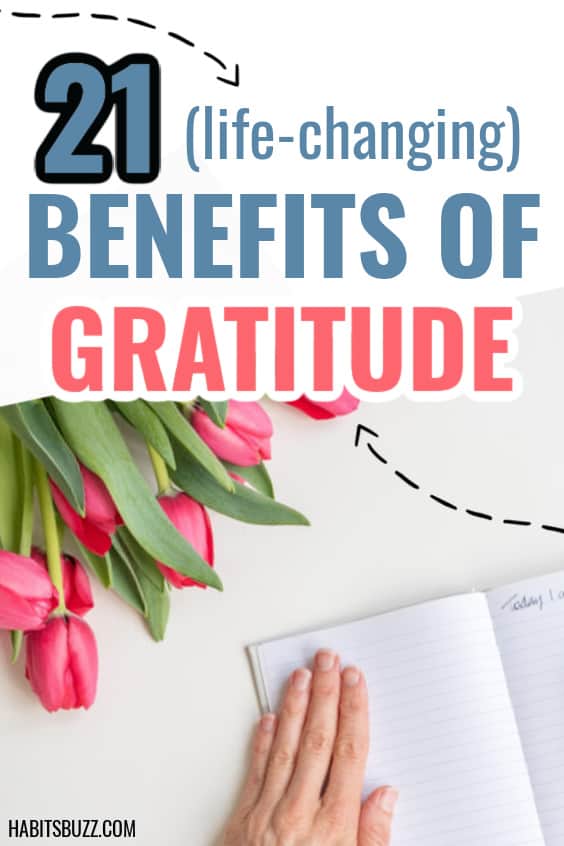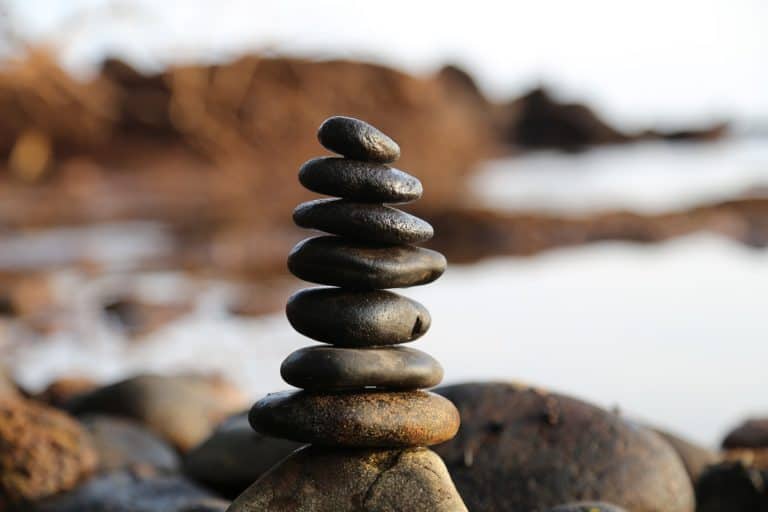21 life-changing benefits of gratitude (and why you should practice it)
I first learned about gratitude habit from the famous book “The Secret”.
After that, a lot of positive changes happened in my thinking and in my life.
The benefits of gratitude have been backed by science. You can also see mentions of gratitude habit in religious texts.
Let’s see what gratitude is and why gratitude is important.
**This post contains affiliate links. I may receive a small commission at no extra cost to you if you make a purchase through my affiliate link**
What is gratitude?
Gratitude or gratefulness is not just an act of saying thanks. Gratitude is an emotion you feel in your heart.
Simply saying thanks and firmly observing gratitude habit is different. When you are in a truly grateful state, you experience pure bliss.
Your heart is full and you feel so much joy that happy tears can flow from your eyes. You feel happy about your existence.
When you are in a truly grateful state, you feel happy for what you have. You feel so happy about what you have and you cannot notice what you lack in life.
Life feels enough in the present moment. There is nothing you need more or less. You feel content at the moment.
Why is gratitude important?
Without gratitude, it’s hard to feel content. You might get happy when you receive something new, but it won’t last.
After a while, you tend to take everything you have for granted. Even though you might be blessed with more than other people, you fail to feel happy about it.
It’s human nature to forget. If we couldn’t forget old things, we wouldn’t be able to heal our wounds and live.
But when we forget to appreciate what we have, it can make us unhappy. We will keep looking for new things to make us happy.
Therefore, a deliberate gratitude practice should be made part of our lives to maintain positivity in life.
If this doesn’t feel like a good enough reason, let’s see what are the benefits of gratitude and how it can transform your life.
Benefits of gratitude
1. GRATITUDE MAKES YOU HAPPIER
Positive psychology research shows that gratitude and happiness are interrelated.
When we are grateful we experience more positive emotions and therefore we feel happier. Grateful people enjoy each experience to the maximum as they truly take the effort to go deep and appreciate it.
When we express gratitude and receive the same, our brain releases dopamine and serotonin, the two important neurotransmitters responsible for our emotions, and they make us feel ‘good’. They enhance our mood immediately, making us feel happy from the inside.
When we are grateful, we do not focus on negativity, and naturally, that puts us in a positive state.
Gratitude has also been shown to improve mental health
In the studies done by Dr. Robert Emmons, professor of psychology at the University of California, researcher, and author of the book Thanks! How the New Science of Gratitude Can Make You Happier, he says daily journaling and gratitude jars can help individuals fighting with depression, anxiety, and burnout.

2. GRATITUDE MAKES YOU HEALTHIER
Gratitude not only impacts mental health, but also physical health.
A study shows that people who practiced gratitude reported better sleep and sleep quality.
Gratitude helps to reduce anxious thoughts and feelings which in turn helps to sleep better. This study also reported fewer physical complaints among them and they spent significantly more time exercising.
The group who did the gratitude practice experienced fewer symptoms of physical illness.
3. Gratitude helps to reduce stress
Have you noticed how some people are always cool no matter what happens in life? While some others are always anxious and stressed when things go wrong. All they can focus on is the things that are wrong.
This difference in optimism is because of the way they view these events. When you are used to find gratitude in everyday life, you can shift your focus towards what’s going right in your life and be less stressed.
This doesn’t mean you should push emotions like sadness, grief, anger, etc. inside. Take your time to be with these emotions and let it all out. Take your time to heal. But instead of dwelling there more than needed, you can shift your focus to the good things in life.
A study from the University of California San Diego’s School of Medicine found that people who were more grateful actually had better heart health, specifically less inflammation and healthier heart rhythms.

4. GRATITUDE HELPS YOU TO BECOME LESS MATERIALISTIC
When you are grateful for what you have, you need less stuff to live. You do not get addicted to buying the next flashy thing to feel good about your life.
Materialistic people relate happiness with materialistic things. They find it hard to be grateful due to unmet needs. And they try to meet those needs through materialism.
But when you realize this fact and find gratitude in what you already have, you know your life is good enough with what you already have.
Related:
5. GRATITUDE MAKES US COMPLAIN LESS
When we are grateful, we focus more on our blessings, and therefore we have less to complain about.
If we are to complain, there will be a lot to complain about every single day. But at the same time, we also have a lot to be thankful for every day, which we take for granted.
When we are grateful and complain less, we are more pleasant to be around. Complainers suck the energy out of people and spread negativity.
Therefore, gratitude helps us to strengthen our relationships too.

6. GRATITUDE HELPS US TO DEVELOP a MORE POSITIVE ATTITUDE TOWARDS LIFE
Another benefit of gratitude is that it helps us to focus on positivity no matter how tough times are. It helps us to be optimistic about our future.
Since gratitude increases one’s satisfaction for his own life, one is less envious and more positive.
7. GRATITUDE MAKES YOU STRONGER
Gratitude not only improves physical health but also mental health. Gratitude helps to reduce stress and overcome trauma.
A 2006 study published in Behavior Research and Therapy found that Vietnam War Veterans with higher levels of gratitude experienced lower rates of PTSD.
And various other studies show how gratitude helps people to bounce back from hard life experiences. Since gratitude helps to focus on our blessings and what’s going right, it helps to build the resilience required to stay strong during hard life events.
8. GRATITUDE STRENGTHENS RELATIONSHIPS
Another benefit of gratitude is improved relationships. When we are grateful for our relationships, we tend to be more appreciative of what our loved ones do for us.
The more appreciative we are, the more positive experiences we get to experience in a relationship.
According to science, the magic relationship ratio is 5:1.
Dr.Gottmann and Robert Levenson began doing longitudinal studies of couples in the 1970s to understand the difference between happy and unhappy couples.
What they found is that the difference between happy and unhappy couples is how they balance positive and negative interactions during conflict.
The magic ratio of 5:1 indicates that for every negative interaction during conflict, there are five or more positive interactions in a happy marriage.
When we focus on the shortcomings of each other, it’s easier to be led to more conflicts. But if gratitude is a virtue we practice daily, it leads to more positive interactions and therefore a healthier relationship.
And this is true in the case of all relationships.

9. GRATITUDE HELPS TO BUILD SELF-ESTEEM
One of the reasons we experience low self-esteem is the comparisons we make with others.
We compare our journey with others and constantly measure our growth. We measure our success and failures based on what others have achieved.
It’s so easy to forget our own growth and feel low about ourselves. But gratitude puts our focus on our own strengths and since we are thankful for what we have, we have more confidence in our life. And that helps us to sincerely appreciate other people’s achievements as well.
10. GRATITUDE HELPS US TO BE MORE RESILIENT AND DEVELOP HUMILITY
Resilience is the ability to bounce back from tough experiences and face life boldly.
Studies show that those who practice gratitude have more coping skills than those who don’t. Gratitude helps us to be more optimistic, so we are able to face negative life events with an open mind.
Gratitude helps us to deal with stress. During crises – be it trivial daily issues, or major life events – we have the ability to value things and not take our blessings for granted.
Gratitude also helps us to develop humility. Humility is defined as the quality of having a modest or low view of one’s importance.
Humility is an essential value we need in life in order to not become an arrogant person. Gratitude and humility are interconnected. In order to be grateful, we need humility. And to be humble, we need the ability to appreciate the value of whatever we have.
Gratitude helps to develop humility because due to gratitude we have the ability to “see” all the blessings we have in life.
And being a humble person means you are open to more growth in life and you have the ability to accept help and criticism as well. Therefore gratitude also helps you in becoming a more growth-oriented person.

11. GRATITUDE HELPS IN IMPROVING YOUR ENERGY LEVELS
Gratitude also has the benefit of making you more energetic. Try starting your day with a gratitude practice.
There is a difference between just going through the motion of writing and actually feeling gratitude. When you really feel grateful with every ounce of your heart, you feel happy and excited.
It can also come from the fact that you are truly satisfied with your life. When you are satisfied and feel enough, you naturally feel good.
Therefore, gratitude practice as soon as you wake up is highly recommended for an energetic start to the day.
Related:
- 10 morning routines of highly successful people
- 11 toxic morning habits to quit to stop wasting your day
12. GRATITUDE MAKEs YOU LESS JEALOUS
Feelings of jealousy create insecurity and lack in our lives. We feel jealous when others have more abundance than us or they have something specific that we don’t have.
But what we forget is nobody has it all. Maybe we have something that they don’t have, but we are blind to our own blessings when we are ungrateful.
Gratitude helps to shift your focus towards what we have, and therefore we know that even though we don’t have everything, we are still blessed in so many ways.
Feeling a tint of jealousy is natural. It can sometimes motivate us to improve our lives too. But if we get consumed in jealousy, it can make us suffer.
When we have the habit of gratitude, it helps to immediately change our attention from lack to abundance constantly. It takes practice, but once you get used to the grateful way of thinking, you can be a happy person and also appreciate other people’s successes.
Related: What is hygge? A beginner’s guide to the Danish secret to happiness

13. GRATEFUL PEOPLE ARE MORE GIVING
Gratitude helps in reducing self-centeredness. Grateful people like giving because they want to help other people and improve their lives.
When our cup is full and overflowing, we naturally have the inclination to give as we want others to experience a slice of that happiness as well.
And also, when we are grateful for other people’s favors, it motivates us to return the favor back. It can be not only to those who helped us but also to pay it forward to people we don’t know as well.
Therefore gratitude helps us to become kinder people.
14. GRATITUDE HELPS TO IMPROVE PRODUCTIVITY
When we are in a grateful state, changes happen at the molecular level in our body. When we feel grateful, we feel good because our brain releases a neurotransmitter called dopamine.
Dopamine helps us to improve energy levels, improves mood, and focus which helps us to feel more motivated.
This helps us to be more productive and we are more excited to tackle our daily goals.
Related:
- 5 simple ways to improve productivity in your day
- How weekly planning helped me to skyrocket my productivity
- 8 must-have Sunday habits to make sure you have a productive day
- 45 productive things to do instead of social media

15. GRATITUDE HELPS YOU TO EXERCISE MORE
Grateful people have been found to take care of their health better. Grateful people love their body and that motivates them to take care of their bodies better.
When we feel more love toward ourselves, we feel the need to take care of ourselves more. That helps in regular exercise and healthy eating.
Related:
- 125 brilliant inspirational quotes on loving yourself
- 10 super healthy habits that are worth adopting in life
16. GRATITUDE HELPS TO ACHIEVE GOALS
If you want to achieve your goals, you need focus and patience. Gratitude helps in both.
Gratitude helps you to turn your focus away from the next shiny thing. How?
Have you noticed how your saving goals are derailed by the “impulse need” to buy a new gadget? Or you want a new dress just because it’s on sale (and you forget you have lots of dresses in your wardrobe).
But when you are grateful for what you have, you become less materialistic and that helps you to stay on track with your saving goals.
And also, when you have a goal it’s sometimes easy to forget how far you have come when you face challenges.
But in such moments, taking a moment to be grateful can make all the difference.
You are reminded of how much your life has changed from last year and that motivates you to keep going. Thus gratitude helps us to have the patience we need to achieve our goals.
Since gratitude has also proven to be beneficial in reducing stress, the chances of achieving our goals are better, as we are better equipped to solve challenges.
17. GRATITUDE HELPS TO ENHANCE EMPATHY
Grateful people are less aggressive and more empathetic. They express more pro-social behaviors.
Grateful people are likely to express sensitivity and are more likely to be concerned for others.
In a study done by the UK College of Arts & Sciences psychology Professor Nathan DeWall with more than 900 undergraduate students showed that gratitude is linked to lower aggression.

18. GRATITUDE HELPS YOU TO SURRENDER
Life is unpredictable most of the time. In order to face the challenges offered by life, we must learn to surrender.
When you surrender, you are surrendering your ego to the wisdom available inside you.
Most people are not able to access this wisdom because we are disconnected from our intuition.
When life throws challenges, if you can be grateful for every experience no matter what, you come out of it stronger.
We have the option to complain and we have the option to accept where we are. Since every experience is there to teach us something, everything eventually happens for good.
Hence gratitude is what we can implement to face challenges.
19. GRATITUDE ENHANCES MINDFULNESS
Mindfulness means focusing on the current moment without judgment. When we are mindful, we are accepting the situation as it is.
When it comes to pain and suffering, people keep feeling hurt even though the event happened years ago. Why is that?
It is because we keep replaying these events in our minds over and over and keep hurting ourselves.
When you are mindful, you are able to view these events without attaching emotions to them. You are not denying it either. You just let it pass through you. Eventually, you learn to forgive and forget.
Mindfulness is such a powerful tool. If you want to lead a happy and peaceful life, you should be able to stop strengthening the painful events.
But how is gratitude connected to mindfulness?
Gratitude helps us to open our minds more towards the blessings in life and when we also implement mindfulness, we are able to be aware of the blessings more. Because mindfulness is about being in the moment and being present.
We can’t enjoy our blessings without being present, right? Thus gratitude and mindfulness feed on each other.
20. GRATITUDE HELPS US TO HEAL
Gratitude helps us to heal from painful events that happen in life. All you need to do is ask different questions.
When misfortunes strike us, many of us ask “why me?”.
This question reminds me of the beautiful story of Arthur Ashe, the first black man to win the U.S. Open, Australian Open, and Wimbledon.
During a heart surgery in 1983, he got infected by the blood that he received and contracted AIDS.
He received letters from all over the world in which one of the fans asked him, “Why did God choose you to have such a bad disease?”
To which he replied,
50 million children start playing tennis, 5 million learn to play tennis,
500,000 learn professional tennis, 50,000 come to the circuit, 5000 reach the grand slam,
50 reach Wimbledon, 4 to the semi-final, and 2 to the finals.
When I was holding a cup I never asked God, ‘Why me?’.
And today in pain I should not be asking God, ‘Why me?”
If I were to say “God, Why me?” about the bad things, then I should have said, “God, Why me?” about the good things that happened in my life.”
When we practice gratitude, we learn to ask different questions. We have so many blessings for which we do not ask the question of why.
We don’t ask, “Why do I have such an incredible family?”
We don’t ask, “Why do I have the job I love?”
What we focus on, expands. That’s how gratitude can help you heal. If you keep your focus on your pain and misfortunes, it can consume your life. When you focus on the blessings, that acts as a coping technique to heal your pain.
Gratitude can help to get you through the darkest of days, one at a time.
21. GRATITUDE CHANGES YOUR BRAIN
In a recent study conducted on nearly 300 adults – mostly college students who were seeking mental health counseling at a university – it was found that after three months of psychotherapy sessions when they were grateful they showed greater neural sensitivity in the medial prefrontal cortex, a brain area associated with learning and decision making.
This suggests that people who are more grateful are also more attentive to how they express gratitude.
This study also shows compared to those who wrote gratitude letters for three months with those who didn’t, the gratitude letter writers showed greater activation in the medial prefrontal cortex when they experienced gratitude.
This shows how gratitude can have a lasting effect on your brain.
Gratitude habit offers many benefits and thus it is a good habit to have in life.
What would you add to the list? Do let me know in the comments below!
Like this post? Please take a moment to PIN and SHARE!








